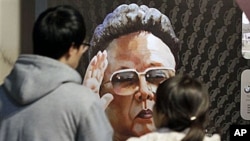The South Korean government says that more than 10,000 North Koreans reached the South during the past three years.
South Korea's government said Monday the total number of North Korean defectors has surpassed 20,000 since the end of fighting in the Korean War in 1953.
Unification Ministry spokeswoman Lee Jong-joo says number 20,000 arrived in South Korea last Thursday.
"The 20,000th defector was a 41-year-old woman identified only as Kim. She came from Yanggang province, North Korea, with her two sons," Lee said.
About half of the defectors have arrived since 2007. Around 2,900 defected just last year.
Unification Ministry officials say they expect the number of defectors to steadily increase because of continued economic hardship and hunger in the impoverished country.
The two Koreas are divided by a heavily fortified border, so most travel through China before reaching here.
Aid groups say tens of thousands more defectors may be hiding in China. The Chinese government returns any it finds to North Korea.
The number of defectors began rising after North Korea was swept by famine in the mid-1990's.
The food situation in the North has again become critical.
Victoria Sekitoleko is the Food and Agricultural Organization's regional representative, and most recently visited North Korea in September. Monday she said that more than 30 percent of all North Koreans are facing substantial undernourishment.
"I have visited homes, I have visited schools, I see these people along the road. I go where they go," she said. "Wherever I go you look in the eyes of somebody and you see a starving person."
Sekitoleko says it would not take much additional outside assistance for North Korea to reach a basic level of self-sufficiency when it comes to food.
"If they can have the amount of fertilizer of 700k tons annually. If they can have the seeds - because until now, they do not have good high-tech seeds. And if they could have the fuel, plus the spare parts (for farm equipment) I'm sure they can produce enough food to feed their country," Sekitoleko states.
Aid officials say sanctions on Pyongyang, because of its nuclear program, have made donor nations reluctant to provide aid. China, South Korea and the U.N's World Food Program are the primary sources of food assistance for North Korea.
FAO's Sekitoleko says the U.N. programs tasked with helping reduce the food shortage are underfunded. "The world has told us to be there but they are starving us of any resources," Sekitoleko said.
The U.N.'s World Food Program executive director, Josette Sheeran, who visited North Korea earlier this month, says her agency has only about 20 percent of the money it needs to fund its project to boost nutrition among women and children in North Korea.
The FAO is expected to release its latest report on the food situation in North Korea early this week.
The food shortage has worsened in recent years because of flooding. The FAO says the most recent flood hit at the peak of the vegetable-growing season.




